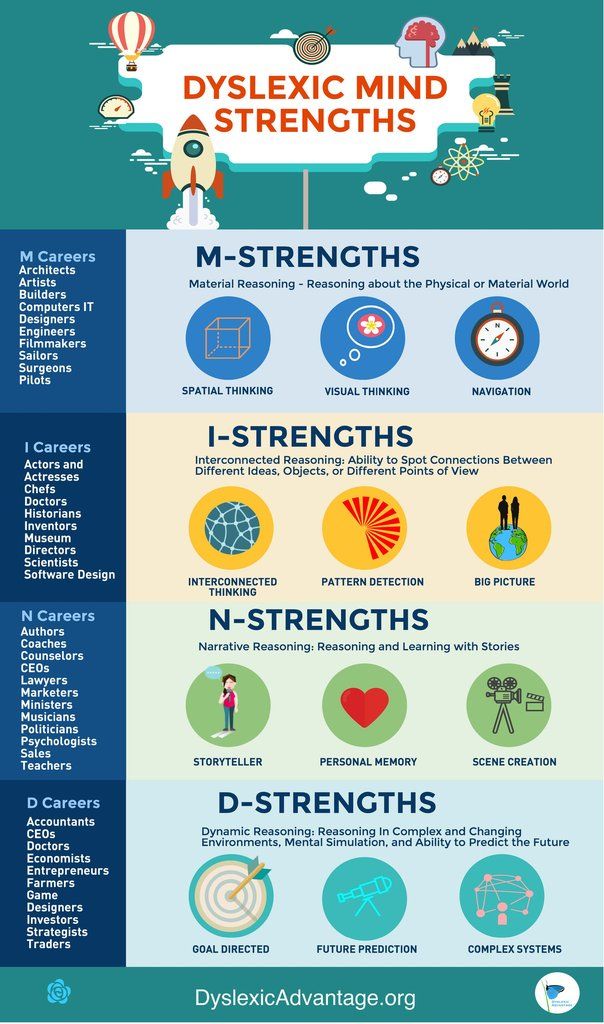Confidence
Raising Dyslexic Kids: Self-Awareness and Acceptance
If you parent a dyslexic child, you know your child thinks differently.
Posted September 20, 2016 Reviewed by Ekua Hagan

If you are the parent of a dyslexic child, you know your child thinks differently. They are creative, imaginative, and outside-of-the-box thinkers. They are artists, builders, and designers. They are storytellers and junior entrepreneurs. They are problem-solvers. They have strong memories for everything they have experienced and learn best when the information is presented in a meaningful way.
If you are a parent of a dyslexic child, you also know your child had trouble learning to read, is a poor speller, has trouble with punctuation and capitalization, and likely has poor handwriting. They also have trouble taking tests, getting their thoughts out on paper and showing what they know with writing. They have trouble with rote memorization and are challenged with remember the sequence of completing daily tasks.
As my colleagues, Drs. Brock and Fernette Eide have said, the dyslexic brain is designed to do different things from the non-dyslexic brain. That has been my experience as a dyslexic person raising dyslexic children and has the fortune of working with dyslexic people.
Dyslexics think differently than non-dyslexics. They are good at thinking about the big picture, getting the gist of the situation, reading people and situations, and coming up with novel solutions and ideas that can impact the masses. Here’s the catch: We have to get our dyslexic kids through school feeling good about who they are and what they are capable of.
It is hard to see your child struggle. You may not have had the same struggles as your child and therefore have trouble understanding why certain things are so hard for them. Alternatively, you may have had the same struggles as your child and you do not want them to struggle as you did. To further complicate things, you may be re-experiencing your school struggles as you watch your child have a similar experience.
As with most things related to being a parent, being aware of what you are experiencing, how you feel, and why you may be feeling that way is key to figuring out and planning how you want to respond to your child. Being self-aware and using that self-awareness to separate your experience from your child’s experience is critical in helping your child find their way.
When it comes to raising a dyslexic child, there are a few key things to focus on and ask yourself. What are your child’s strengths? What do they like to do? What interests them? What motivates them? What makes them feel good about themselves and gives them self-confidence?
The answers to these questions will guide the activities, programs, mentoring, and life experiences you will create to allow them to develop their preferences and skills, and derive a strong sense of who they are.
The next critical element is to provide support for their areas of challenge. They will need help learning to read and/or read fluently, help with starting and organizing their writing, learning how to study and stay organized, and learning how they learn best. They will need to learn to self-advocate and tell teachers what they need to learn the material and show what they know.
Equally important is for your child to get the accommodations they need to reduce the impact of their dyslexic processing style in school settings. They will need to have more time for tests, writing, and projects. They will benefit from audiobooks, keyboarding, and dictation software. Finally, they will benefit from having multiple ways to show they know the material such as Powerpoints, oral presentations, and oral tests.
Healthy people understand and own their strengths and their weaknesses. Healthy people are self-aware. We must model this self-awareness for our children (whether we are dyslexic or not) and help them own and accept who they are. We must accept ourselves (whether we are dyslexic or not) and show our kids how to live by utilizing our strengths and accepting our weaknesses. We must model persistence and perseverance. We must help our dyslexic children understand that although it often may not feel like it, they have an advantage. They have a different brain designed for different things, amazing things. Show them what is possible by focusing on their strengths, supporting and accommodating their weaknesses, and showing them that you are doing the same in your own life.
Be the person you want your child to become.
For more information about the Dyslexic Minds poster, please visit Dyslexic Advantage.




